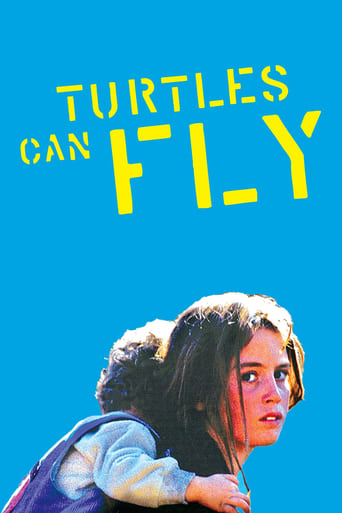e-53976
The energetic film, with a dark sense of humor, charges into one impending critical situation after another and never pauses to look back to evaluate what took place. Many possible subplots are brought up and just as quickly are forgotten (such as, an Iranian doctor in Iraq searching for an armless boy who makes predictions). It's a messy film but is strangely lyrical and moving, as it paints its ugly picture of a war-torn country that was promised by Bush that this war would make things better. The final shot of the once optimistic Satellite, now on crutches from a minefield explosion, turning his back on the American soldiers passing through his village, the same soldiers he a short time ago welcomed as the saviors of his people, tells us how that optimism has faded.
thmurphy-37414
Turtles Can Fly is a very good movie when it comes to explaining the conflict between Iraq and the United States. This movie focuses mainly on the viewpoint of children during the war. The movie takes place in Iraq, following the Kurds and the different villages they have due to being split up. As everyone knows or does not, the Kurds are the largest ethnic group without a nation. The main character Satellite is really the only boy in the whole village who is older than all the other boys. Every other boy except for the boy with no arms is much younger than Satellite, which is very odd. Satellite is named satellite for his ability to set up satellites for the neighboring villages and I guess he does a pretty good job at it. He is in love with a girl named Agrid who was raped and then had a child. She dislikes her child as she does not believe it is hers, and eventually ends up killing the baby after mainly countless trials. An interesting view point I saw throughout the film was the changing idea of the Americans to Satellite. At the beginning of the movie he was amazed by everything about the Americans, until they actually come and he experiences the pain from war. He hurts his foot on a land mine and after that just does not know what to do anymore as he feels there is no hope for him. I recommend anyone who is interested in this conflict to see the film.
sir-mauri
Wow , this is some truly powerful film making . The children were directed masterfully , I felt like (for the most part) that they were entirely convincing conveying their emotions and this is most likely down to the fact of the matter that they actually have been affected by this war in some way or another . Aside from a slight pacing issue in the 2nd act , this is an excellent but devastating story . Turtles Can Fly really does show the affects of war through children's perspectives tremendously well . Fantastic shot composition and cinematography juxtaposing the bleak , dry landscape of Iraq with remains of USA manufactured be vehicles and technology. Pictures can speak 1000 words and this film really proves that . Real genuine moments of humane actions , this film never feels overly sentimental or preachy , best described as a Hirokazu Koreeda film set in Iraq.
Claudio Carvalho
On the Kurdish refugee camp on the Iraqi-Turkish border, the boy Satellite (Soran Ebrahim) is the leader of the kids. He commands them to clear and collect American undetonated minefields in the fields to sell them in the street market and he installs antennae for the villagers. He goes with the local leader to buy a parabolic antenna to learn the news about the eminent American invasion but nobody speaks English and Satellite that knows a couple of words is assigned to translate the Fox News. When the orphans Agrin (Avaz Latif) and her armless brother Hengov (Hiresh Feysal Rahman) and the blind toddler Riga come from Halabcheh to the camp, Satellite falls in an unrequited love for Egrin. But the girl is traumatized by a cruel raid in her home, when her parents were murdered and she was raped. She wants to leave Riga behind and travel with her brother Hengov to another place, but he does not agree with her intention. "Lakposhtha parvaz mikonand", a.k.a. "Turtles can Fly", is a heartbreaking movie with a war that is not shown on TV News where the victims are the children. The cast is formed by real refugees and is impressive the top-notch performances of the children. The title is curious since turtles lives on the water and on the land but do not fly. However, it is a metaphor since Bahman Ghobadi compares this reptile that moves from water to the land with the homeless Kurds that migrate moving forward. The fly might be a metaphor for the liberation from Saddam Hussein's regime. My vote is eight.Title (Brazil): "Tartarugas Podem Voar" ("Turtles can Fly")



